A Guide to Assessments
By Ekpreet Sahota
Assessments at university may seem quite daunting, but remember that all the skills you have acquired from doing coursework and exams during GCSEs and A-levels will have prepared you well! In this blog I will be telling you all about what type of assessments you can expect in a biomedical (or any other science-related) degree, as well as some tips.
COURSEWORK
Unlike an exam, you usually have several days or weeks to complete coursework. There is usually a schedule of assessments given to you at the beginning of the year where you can see when coursework’s will be released and when they are due. For coursework, you can use your notes, textbooks and the internet to aid you in developing the content for your work. For every module I had there was always some form of coursework in addition to the exam. These were some of the different forms of coursework:
Oral Presentations: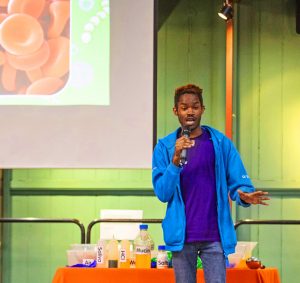
As much as you may want to avoid it, you will almost definitely have to do at least one presentation during your time at university! Oral presentations usually require you to make a PowerPoint presentation which you will then present in front of the examiners and often, your coursemates. One of the most important things I learned from making presentations is to not have text-heavy slides! This will stop you from reading from the slides the whole time which doesn’t look good as you must engage with the audience. It is also unlikely anyone will read that much text and it can be quite distracting to the examiners, so it’s important to identify the key information you need. Your slides should also be aesthetically pleasing – adding images, graphical abstracts or figures (where relevant) can take your presentation to the next level. Besides assessing the quality of information you’re presenting, speaking with a strong voice and making eye-contact is another thing that examiners will mark you on!
I initially found oral presentations to be the scariest type of coursework, but I must say that doing them built up my confidence and I gradually got better at them. Practicing doing my presentation beforehand with a group of friends has always been beneficial as I was able to check If I was within the time limit, and it also got rid of some of the nerves before I had to present to the examiners.
Written Reports:
This type of coursework is also quite common and the type of report you have to write can vary. These are some of the different types:
- Literature Review: You are given a hypothesis/question/topic area to address by looking at several different biomedical research papers. This type of coursework usually requires you to present a balance of evidence – some which support the hypothesis and some which don’t. In the end you make your own conclusion from all the evidence you have gathered and state whether the hypothesis may be true.
- Lab Report: I had to write a report at the end of my lab project. This is quite a different format from a standard report and reflects the layout of a biomedical research paper. It includes sections such as an abstract, introduction, materials, procedures, results and conclusion.
- Article: We would be given a biomedical research paper from which we would have to write an article which summarised and simplified the content of the research paper that would be suitable for non-experts at a college-educated level.
Written reports usually have a strict word limit, so one thing you will need to learn is how to keep your sentences clear and concise. Written reports were probably my least favourite as I found it quite difficult to take a creative approach with them like I could with my other coursework.
Digital Posters:
When I first heard of digital posters I was quite excited to see what this would entail as I had never made one before. The content of the digital posters was very similar to that of a lab report, but way more simplified. We would have to summarise the findings of a research paper, or of our own experiments, on a poster the size of one PowerPoint slide.
Digital Storytelling:
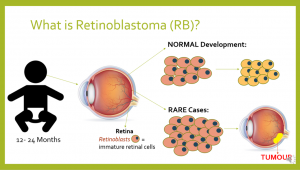 I loved this type of coursework! Who would have ever thought coursework could be fun? This was a pretty unique type of coursework and allowed people to take a very creative approach. We were again given a certain topic from one of our modules, from which we were then tasked with developing a short video with animations, along with a voiceover explaining the topic. The topic usually surrounded a biological process or phenomenon, for example one of my topics was ‘Retinoblastoma (eye cancer)’. This was a great topic for me to use animations as I was able to visually demonstrate how the cancer arises through mutations in certain genes. Some people had really fancy animation software to make their videos and some (like me) simply used PowerPoint – and this was one of my best graded assignments! One thing this taught me was that it’s always best to stay simple, keep the objective in mind and don’t get too carried away.
I loved this type of coursework! Who would have ever thought coursework could be fun? This was a pretty unique type of coursework and allowed people to take a very creative approach. We were again given a certain topic from one of our modules, from which we were then tasked with developing a short video with animations, along with a voiceover explaining the topic. The topic usually surrounded a biological process or phenomenon, for example one of my topics was ‘Retinoblastoma (eye cancer)’. This was a great topic for me to use animations as I was able to visually demonstrate how the cancer arises through mutations in certain genes. Some people had really fancy animation software to make their videos and some (like me) simply used PowerPoint – and this was one of my best graded assignments! One thing this taught me was that it’s always best to stay simple, keep the objective in mind and don’t get too carried away.
TOP TIPS FOR COURSEWORK:
- Plan, plan, plan! Making a rough plan/checklist before you get stuck into your coursework will ensure you’re hitting all the key aspects required.
- Start working on your coursework as soon as you can – leaving it two days before the deadline is never a good idea!
- Have a friend read over your work/watch you present – hopefully they will be able to spot mistakes you weren’t able to see.
- Keep noting down any references you use along the way as you will always need to provide a list of references.
EXAMS
I found that the main difference between exams at college and university was the length – exams at university can be up to 3 hours long! This did seem like a lot of unnecessary time at first, but every minute counted. Each of my exams had these three sections which you might be familiar with already:
- Recall Questions: types of questions that do not require abstract thinking, require very little explanation and usually have one- or two-word answers. These were often in the format of multiple-choice questions.
- Data interpretation: Data from biomedical experiments are presented in the form of different graphs, tables and images. The questions asked us to infer trends and make conclusions based on the data presented.
- Essay Question: This question is usually at the end of the paper and provides the most marks. In these types of questions, you will need to use all of the knowledge learned, sometimes from across different topics, to discuss a given question or statement.
TOP TIPS FOR EXAMS:
- Schedule a revision time-table. This will ensure you cover everything you need to know in time for your exams.
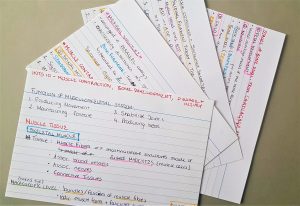
- Study with a friend/small group where you can test each other.
- Make flashcards with only the most important of information. I made flashcards specifically for exams from the notes I had written during lectures. Making flashcards might not be for everyone, but I used them for my exams in my second year and it helped a lot!
LAB PRACTICAL
A lab practica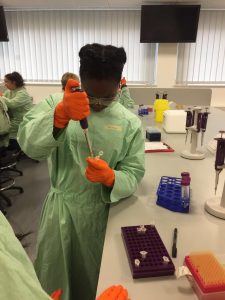 l is something you can definitely expect to do in a biomedical degree. My lab practical was in the form of a ‘carousel’. There would be different stations at each lab bench, and each station would have a different question (e.g. ‘how many cells are in this sample?’ or ‘what is the weight of this protein?) and various equipment. We were then required to use this equipment to answer the question which allowed us to demonstrate the lab skills and techniques we learned throughout the year. Instead of teachers assessing us by observing us implementing these lab techniques, they would just mark the answers we had written to the questions at each station. The answers are a good indication of whether or not we used the lab equipment/techniques correctly.
l is something you can definitely expect to do in a biomedical degree. My lab practical was in the form of a ‘carousel’. There would be different stations at each lab bench, and each station would have a different question (e.g. ‘how many cells are in this sample?’ or ‘what is the weight of this protein?) and various equipment. We were then required to use this equipment to answer the question which allowed us to demonstrate the lab skills and techniques we learned throughout the year. Instead of teachers assessing us by observing us implementing these lab techniques, they would just mark the answers we had written to the questions at each station. The answers are a good indication of whether or not we used the lab equipment/techniques correctly.
TOP TIPS FOR LAB PRACTICALS:
- Make sure your lab book is kept up to date with all the lab procedures you have used throughout the year as your lab book will be a good source of revision.
- I found it quite useful watching YouTube videos of scientists using lab techniques to enhance my understanding in preparation for the practical
- Ask your lab teachers if you can stay behind during lunch or after lesson to practice some more
Some Words of Advice…
“The greatest amount of wasted time is the time not getting started” – Dawson Trotman
Procrastination is something we all struggle with. One of the worst feelings is  that extreme guilt you feel once you put your phone down after a couple hours realising you didn’t do any work. The hardest part is actually getting started, but once you make that first step of simply just planning for your coursework/revision timetable it will be much easier to begin the work. I found that the best way for me to work was in small 30-45-minute chunks, having a 10-minute break, and then get back to working again. This ensured that for the time that I was working, I was very productive. It is also good to have a goal set in your mind for what you want to achieve by the end of the day and really stick to it. For example, one of my goals would be “ by today I need to finish my introduction, abstract and material section and start on the procedure section for my lab report”. I also found that my sleep schedule was really important when it came to exam season. I was much more focused working earlier in the morning, rather than working into the late hours of the night which would make me feel unmotivated the next day. It may take some time for you to figure out what type of work method/schedule works best for you – if you’re still struggling why not ask a friend how they deal with their workload?
that extreme guilt you feel once you put your phone down after a couple hours realising you didn’t do any work. The hardest part is actually getting started, but once you make that first step of simply just planning for your coursework/revision timetable it will be much easier to begin the work. I found that the best way for me to work was in small 30-45-minute chunks, having a 10-minute break, and then get back to working again. This ensured that for the time that I was working, I was very productive. It is also good to have a goal set in your mind for what you want to achieve by the end of the day and really stick to it. For example, one of my goals would be “ by today I need to finish my introduction, abstract and material section and start on the procedure section for my lab report”. I also found that my sleep schedule was really important when it came to exam season. I was much more focused working earlier in the morning, rather than working into the late hours of the night which would make me feel unmotivated the next day. It may take some time for you to figure out what type of work method/schedule works best for you – if you’re still struggling why not ask a friend how they deal with their workload?

